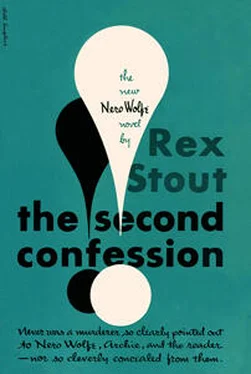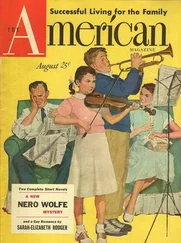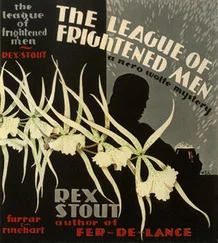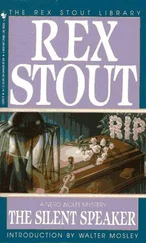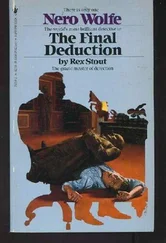Rex Stout - The Second Confession
Здесь есть возможность читать онлайн «Rex Stout - The Second Confession» весь текст электронной книги совершенно бесплатно (целиком полную версию без сокращений). В некоторых случаях можно слушать аудио, скачать через торрент в формате fb2 и присутствует краткое содержание. Город: New York, Год выпуска: 1949, Издательство: Viking Press, Жанр: Классический детектив, на английском языке. Описание произведения, (предисловие) а так же отзывы посетителей доступны на портале библиотеки ЛибКат.
- Название:The Second Confession
- Автор:
- Издательство:Viking Press
- Жанр:
- Год:1949
- Город:New York
- ISBN:нет данных
- Рейтинг книги:4 / 5. Голосов: 1
-
Избранное:Добавить в избранное
- Отзывы:
-
Ваша оценка:
- 80
- 1
- 2
- 3
- 4
- 5
The Second Confession: краткое содержание, описание и аннотация
Предлагаем к чтению аннотацию, описание, краткое содержание или предисловие (зависит от того, что написал сам автор книги «The Second Confession»). Если вы не нашли необходимую информацию о книге — напишите в комментариях, мы постараемся отыскать её.
actually stirs himself and leaves his house.
The Second Confession — читать онлайн бесплатно полную книгу (весь текст) целиком
Ниже представлен текст книги, разбитый по страницам. Система сохранения места последней прочитанной страницы, позволяет с удобством читать онлайн бесплатно книгу «The Second Confession», без необходимости каждый раз заново искать на чём Вы остановились. Поставьте закладку, и сможете в любой момент перейти на страницу, на которой закончили чтение.
Интервал:
Закладка:
There was one little cheep from him. Shortly after nine the house phone buzzed. He asked if any of the boys had called and I said no, and he said that when they did I was to call them off. I asked if that included Fred, and he said yes, all of them. I asked if there were fresh instructions, and he said no, just tell them to quit.
That was all for then. I spent two hours with the morning mail and the accumulation in my drawer. At 11:02 he entered, told me good morning as he always did no matter how much we had talked on the phone, got installed behind his desk, and inquired grumpily, “Is there anything you must ask me?”
“Nothing I can’t hold, no, sir.”
“Then I don’t want to be interrupted. By anyone.”
“Yes, sir. Are you in pain?”
“Yes. I know who killed Mr. Rony, and how and why.”
“You do. Does it hurt?”
“Yes.” He sighed deep. “It’s the very devil. When you know all you need to know about a murderer, what is ordinarily the easiest thing to prove?”
“That’s a cinch. Motive.”
He nodded. “But not here. I doubt if it can be done. You have known me, in the past, to devise a stratagem that entailed a hazard. Haven’t you?”
“That’s understanding it. I have known you to take chances that have given me nightmares.”
“They were nothing to this. I have devised a stratagem and spent fifteen thousand dollars on it. But if I can think of a better way I’m not going to risk it.” He sighed again, leaned back, closed his eyes, and muttered, “I don’t want to be disturbed.”
That was the last of him for more than nine hours. I don’t think he uttered more than eighty words between 11:09 in the morning and 8:20 in the evening. While he was in the office he sat with eyes closed, his lips pushing out and in from time to time, and his chest expanding every now and then, I would say five inches, with a deep sigh. At the table, during lunch and dinner, there was nothing wrong with his appetite, but he had nothing to offer in the way of conversation. At four o’clock he went up to the plant rooms for his customary two hours, but when I had occasion to ascend to check on a few items with Theodore, Wolfe was planted in his chair in the potting room, and Theodore spoke to me only in a whisper. I have never been able to get it into Theodore’s head that when Wolfe is concentrating on a business problem he wouldn’t hear us yelling right across his nose, so long as we don’t try to drag him into it.
Of the eighty words he used during those nine hours, only nine of them — one to an hour — had to do with the stratagem he was working on. Shortly before dinner he muttered at me, “What time is Mr. Cohen free in the evening?”
I told him a little before midnight.
When, in the office after dinner, he once more settled back and shut his eyes, I thought my God, this is going to be Nero Wolfe’s last case. He’s going to spend the rest of his life at it. I had myself done a good day’s work and saw no sense in sitting on my fanny all evening listening to him breathe. Considering alternatives, and deciding for Phil’s and a few games of pool, I was just opening my mouth to announce my intention when Wolfe opened his.
“Archie. Get Mr. Cohen down here as soon as possible. Ask him to bring a Gazette letterhead and envelope.”
“Yes, sir. Is the ironing done?”
“I don’t know. We’ll see. Get him.”
At last, I thought, we’re off. I dialed the number, and after some waiting because that was a busy hour for a morning paper, got him.
His voice came. “Archie? Buy me a drink?”
“No,” I said firmly. “Tonight you stay sober. What time can you get here?”
“Where is here?”
“Nero Wolfe’s office. He thinks he wants to tell you something.”
“Too late.” Lon was crisp. “If it will rate the Late City, tell me now.”
“It’s not that kind. It hasn’t come to a boil. But it’s good enough so that instead of sending an errand boy, meaning me, he wants to see you himself, so when can you get here?”
“I can send a man.”
“No. You.”
“Is it worth it?”
“Yes. Possibly.”
“In about three hours. Not less, maybe more.”
“Okay. Don’t stop for a drink, I’ll have one ready, and a sandwich. Oh yes, bring along a Gazette letterhead and envelope. We’ve run out of stationery.”
“What is it, a gag?”
“No, sir. Far from. It may even get you a raise.”
I hung up and turned to Wolfe. “May I make a suggestion? If you want him tender and it’s worth a steak, I’ll tell Fritz to take one from the freezer and start it thawing.”
He said to do so and I went to the kitchen and had a conference with Fritz. Then, back in the office, I sat and listened to Wolfe breathe some more. It went on for minutes that added up to an hour. Finally he opened his eyes, straightened up, and took from his pocket some folded papers which I recognized as sheets torn from his memo pad.
“Your notebook, Archie,” he said like a man who has made up his mind.
I got it from the drawer and uncapped my pen.
“If this doesn’t work,” he growled at me, as if it were all my fault, “there will be no other recourse. I have tried to twist it so as to leave an alternative if it fails, but it can’t be done. We’ll either get him with this or not at all. On plain paper, double-spaced, two carbons.”
“Heading or date?”
“None.” He gazed, frowning, at the sheets he had taken from his pocket. “First paragraph:
“At eight o’clock in the evening of August 19, 1948, twenty men were gathered in a living room on the ninth floor of an apartment house on East 84th Street, Manhattan. All of them were high in the councils of the American Communist party, and this meeting was one of a series to decide strategy and tactics for controlling the election campaign of the Progressive party and its candidate for President of the United States, Henry Wallace. One of them, a tall lanky man with a clipped brown mustache, was saying:
“‘We must never forget that we can’t trust Wallace. We can’t trust either his character or his intelligence. We can count on his vanity, that’s all right, but while we’re playing him up we must remember that any minute he might pull something that will bring an order from Policy to let go of him.’
“‘Policy’ is the word the top American Communists use when they mean Moscow or the Kremlin. It may be a precaution, though it’s hard to see why they need one when they are in secret session, or it may be merely their habit of calling nothing by its right name.
“Another of them, a beefy man with a bald head and a pudgy face, spoke up.”
Wolfe, referring frequently to the sheets he had taken from his pocket, kept on until I had filled thirty-two pages of my notebook, then stopped, sat a while with his lips puckered, and told me to type it. I did so, double spacing as instructed. As I finished a page I handed it over to him and he went to work on it with a pencil. He rarely made changes in anything he had dictated and I had typed, but apparently he regarded this as something extra special. I fully agreed with him. That stuff, getting warmer as it went along, contained dozens of details that nobody lower than a Deputy Commissar had any right to know about — provided they were true. That was a point I would have liked to ask Wolfe about, but if the job was supposed to be finished when Lon Cohen arrived there was no time to spare, so I postponed it.
I had the last page out of the typewriter, but Wolfe was still fussing with it, when the bell rang and I went to the front and let Lon in.
Lon had been rank and file, or maybe only rank, when I first met him, but was now second in command at the Gazette ’s city desk. As far as I knew his elevation had gone to his head only in one little way: he kept a hairbrush in his desk, and every night when he was through, before making a dash for the refreshment counter he favored, he brushed his hair good. Except for that there wasn’t a thing wrong with him.
Читать дальшеИнтервал:
Закладка:
Похожие книги на «The Second Confession»
Представляем Вашему вниманию похожие книги на «The Second Confession» списком для выбора. Мы отобрали схожую по названию и смыслу литературу в надежде предоставить читателям больше вариантов отыскать новые, интересные, ещё непрочитанные произведения.
Обсуждение, отзывы о книге «The Second Confession» и просто собственные мнения читателей. Оставьте ваши комментарии, напишите, что Вы думаете о произведении, его смысле или главных героях. Укажите что конкретно понравилось, а что нет, и почему Вы так считаете.
